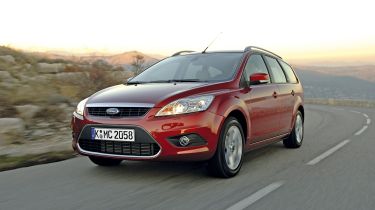Ford Focus Estate
The new Focus has already proved to be one of the best family hatches. Does the addition of a versatile estate broaden its appeal?

The sharp new look helps the Focus Estate do away with its dutiful image. As with the hatch, the update to the styling adds a modern touch to the Focus’s shape, while the spacious boot offers just as much versatility as ever. Will it become a truly desirable lifestyle estate as Ford hopes? Perhaps not, but the facelifted Focus carrier is still a top-value and highly practical alternative to more costly compact MPVs.
You wait years for a new top-selling Ford family, then two come along at once! Hot on the trail of the superb Mondeo, the firm has given its entire Focus range a makeover to bring it in line with its big brother.
Last week, we brought you the world’s first verdict on the updated five-door model. But with 82 variants to choose from, there’s a revised Focus to suit all tastes. On Page 32 we see how the top-of-the-range five-door hatch compares to the class-leading Honda Civic, while here we try the new Estate version for size.
Following the same design brief as the five-door, the load-lugger has been reshaped to fit in with Ford’s latest corporate look. The most significant changes have been made at the front, where Mondeo-style headlamps are positioned above a large new grille. It’s still a world away from the radical Civic, and even Citroen’s sharp C4, but the Ford now appears more modern all-round. Changes to the rear end are less obvious than the tweaks made at the back of the latest Focus hatch, though.
Designers have tried to give the tailgate a lower, more muscular look with a new bumper and revised lamp clusters. Opt for Ford’s directional or xenon headlamps, and you’ll get fashionable LEDs at the back as well. For most models the modifications are discreet, but the overall estate shape is now undoubtedly more distinctive.
To date, 79 per cent of the latest Focus models sold have been five-doors, with Estate variants accounting for 12 per cent. Confident in the updated looks, UK bosses are hopeful that more buyers will be tempted to choose the revamped carrier.
Inside, the dashboard has been given a makeover, and now features Mondeo-style dials, as well as a new layout for the centre console. Higher-quality materials have also been used, but the emphasis is still on durability rather than style. With luggage space unchanged, the 503-litre load area remains one of the most practical in this sector. Fold the seats flat, and the volume increases to 1,546 litres – although if you make use of the spacious rear seats, it’s clear that the Focus Estate is a genuine alternative to many compact MPVs.
While the designers have injected some style, engineers have taken a back seat with the new Focus. Apart from a few minor mechanical tweaks, little has changed under the skin.
But that’s no bad thing. Even in longer and heavier Estate form, the Focus is still one of the best-handling cars in its class. On twisty roads, the suspension manages to iron out any bumps and potholes with ease, while also helping to provide plenty of grip for safe and predictable cornering.
Add direct steering to the mix and you have an estate that’s dynamically superior to nearly all its competitors. Buyers have a wide range of engines to choose from, but the 35 per cent who go for a diesel are getting easily the best package. Despite some minor improvements, the 2.0-litre TDCi still isn’t the quietest oil-burner around, although it delivers torquey performance and 50.4mpg economy.
If fuel efficiency is top of your list of priorities, the Focus will be offered for the first time in ECOnetic trim. This adds skinny tyres and aerodynamic aids to help reduce drag.
Stability control is standard on all models, and when the Estate goes on sale in January, it will be available from £13,895 in Studio spec. The flagship 2.0-litre TDCi powerplant in the car we drove is on offer from £18,695.
Experts predict stronger residuals, too. After three years, the outgoing Focus retains less than 40 per cent of its value; the newcomer should see a four per cent improvement.
If it’s a great all-round load-lugger you’re looking for, the Focus Estate has always been a sensible choice. And with its new styling, the Ford is now more desirable than ever.
Rival: Vauxhall Astra Estate
Another compact estate falling into the workhorse category is the Astra. It’s still reasonably versatile, but now falls behind the facelifted Focus in the style stakes.






